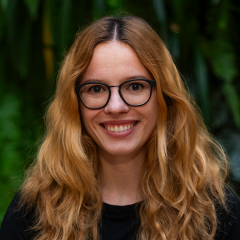Here, CBCS speaks to PhD candidate Sandra Neubert about her recent experience running a workshop and presenting at the recent International Marine Conservation Congress 2024 (IMCC).
Sandra is a data scientist with an interest in spatial planning and ecosystem modelling. Her PhD employs multiple-use spatial planning in the Global South, as part of a collaborative project between the University of Queensland and the University of Exeter. Her research aims to explore how human activities in the marine environment can be effectively integrated into conservation planning to optimize benefits while minimizing the associated costs for both conservation and sustainable use.
“My experience also includes writing R packages for time-efficient and reproducible spatial planning and Shiny apps to facilitate stakeholder engagement. I’m involved in creating tools for multiple projects focused on protected area design, including in the Weddell Sea (Southern Ocean) and across various Indo-Pacific island nations,” says Sandra. “Currently, I’m also doing my HDR Industry Placement with the UN Development Programme (UNDP). Specifically, I’m working with the Spatial Team of the UN Biodiversity Lab (UNBL), a collaboration between UNDP and UNEP-WCMC to support country-led efforts to use spatial data and analytic tools to generate insight and impact for conservation and sustainable development. For this, I’m assisting with the development of spatial data processing and spatial planning tools in support of UNBL’s Essential Life Support Area framework for conservation, restoration and sustainable management.”
Read our Q and A with Sandra here.
Can you tell us about your experience attending IMCC?
Attending IMCC was a valuable experience and my first international conference. Running a workshop and presenting our lab’s work on tool development for stakeholder engagement in conservation planning provided a great opportunity to share ideas and get feedback. I appreciated the chance to connect with others working on similar challenges and explore different approaches to marine conservation. The discussions and exchanges following the workshop and the presentations from all members of the Mathematical Marine Ecology Lab and Applied Marine Biogeography Lab at IMCC were particularly insightful for our future work. It was also my first time in South Africa, so exploring Cape Town was definitely a highlight of the trip.

Can you tell us about your experience leading your workshop at IMCC?
It was a great experience to lead the workshop especially because of the interaction with the participants during the session and the close collaboration with my co-organisers during the planning process.
I led the workshop together with my supervisors Anthony Richardson, Jason Everett and Jennifer McGowan, and had additional help from UQ PhD students Tin Buenafe and Alvise Dabalà when preparing the materials and running the workshop, bringing together a team with extensive experience in conservation planning and organising insightful applied workshops.
A key highlight for the participants was working with real-world data that was used to design the Galapagos marine protected area and that was provided by the Marxan team, thanks to Jennifer’s role as the global Managing Director of Marxan. While we focused on teaching conservation planning theory and the practical use of the conservation planning tool prioritizr, having such a diverse team meant that we were able to not put particular emphasis on a specific planning tool but rather show the participants which tool might be useful for them depending on their needs and individual skill set.
Engaging with participants on both theoretical and practical questions in conservation planning was particularly fulfilling. It was great to share ideas, facilitate discussions, and witness the progression of conversations throughout the workshop. I’m very grateful for the opportunity to share my knowledge in conservation and spatial planning and hope the workshop provided valuable insights for everyone involved.

What inspired you to pursue this project and want to do the workshop?
While conservation planning can help to systematically allocate space for different conservation actions in a cost-efficient way, there are some initial barriers for planners to overcome to get started with spatial prioritisations. This can lead to the use of less systematic approaches when designing protected areas. IMCC offered a great platform to engage with others interested in this topic and we were able to have a very diverse crowd in terms of work area, knowledge and skill sets. We hope that our workshop was able to allow participants a gentle and guided introduction into the field of spatial prioritisation to provide them with basic hands-on skills to formulate, solve, and interpret the results of conservation problems to start applying conservation planning to their own work.

What’s next for you and your work?
After completing my HDR placement, I’m now shifting my focus back to my PhD, with my first-year review approaching early next year. Currently, I’m working on a review article exploring the integration of sustainable use and conservation in spatial planning. I’m doing this from Falmouth, UK, where I’m currently based as part of my QUEX joint PhD programme with the University of Exeter, before returning to UQ at the beginning of next year. Following the interest generated by our conservation planning workshop at IMCC, we’re also planning to run the workshop again in different contexts in the UK over the coming months.
To keep up to date on our latest events, check out our Bluesky and LinkedIn.

